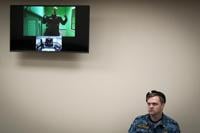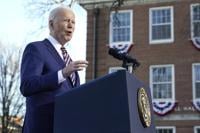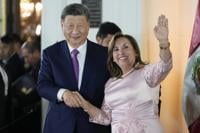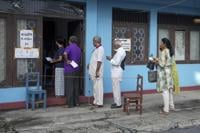Russia's most prominent opposition leader reported new charges against him, while a Moscow court ordered further detention of a state TV journalist-turned-anti-war protester as the Kremlin pressed its campaign against dissent Thursday.
The moves against Alexei Navalny, who is already in jail, and Marina Ovsyannikova, who fled Russia to avoid arrest, coincided with President Vladimir Putin's grant of new emergency powers to local officials to deal with what he considers security threats stemming from the Ukraine invasion.
Several criminal cases have been launched against Navalny, leading his associates to suggest that the Kremlin intends to keep him behind bars indefinitely.
In the latest case, Navalny reported on social media that Russian investigators have launched a probe against him on charges of propagandizing terrorism as well as calling for and financing extremist actions.
Those charges could keep him in prison for 30 years. On Tuesday, a Russian court rejected his second appeal of a nine-year sentence on other charges — fraud and contempt of court.
Navalny, Putin’s fiercest foe, was arrested in January 2021 upon returning to Russia from Germany, where he had been recuperating from a poisoning he blames on the Kremlin. Russian authorities deny responsibility.
He was sentenced to 2 1/2 years in prison for a parole violation that Western leaders have called politically motivated. In March, he was sentenced to nine years in a separate case on charges of embezzling money that he and his foundation raised over the years and of insulting a judge during a previous trial. Navalny has rejected the allegations as politically motivated.
Ovsyannikova, meanwhile, staged one of the most brazen and visible anti-war protests since Russia troops attacked Ukraine on Feb. 24. A few weeks after the invasion, she appeared behind the anchor of a live news broadcast on one of Russia's most widely watched state TV channels holding a poster saying, “Stop the war, don’t believe the propaganda, they are lying to you here.”
She quit her job at the channel, was charged with disparaging the Russian military and fined 30,000 rubles ($270 at the time).
Her legal woes have continued since then, as have her protests.
In the latest action, a Moscow court on Thursday ordered her detained for just under two months, Russia's state-run Tass news agency reported. However, her lawyer said Ovsyannikova had fled to Europe with her daughter, so the court said the detention would begin upon her return. It wasn't clear if she had any plans to return to Russia.
The former TV journalist left Russia to avoid house arrest, which the court had ordered in August pending an investigation and potential trial on charges of spreading false information about Russia’s armed forces. Those charges stemmed from a street protest where she held up a banner reading: “Putin is a killer, his soldiers are fascists. 352 children have been killed (in Ukraine). How many more children should die for you to stop?”
Ovsyannikova was fined at least two more times for disparaging the military on other occasions.
Putin has doubled down in his campaign against dissent since invading Ukraine, and emergency security powers he authorized Wednesday allow local leaders to take more draconian steps.
Hundreds of Russians have been arrested at anti-war street protests, and others have been detained either for directly criticizing the war or simply not using the Kremlin's term for it, “special military operation.”
Hundreds of thousands of other Russians have fled their homeland because of their opposition to the war or complications from it.








































